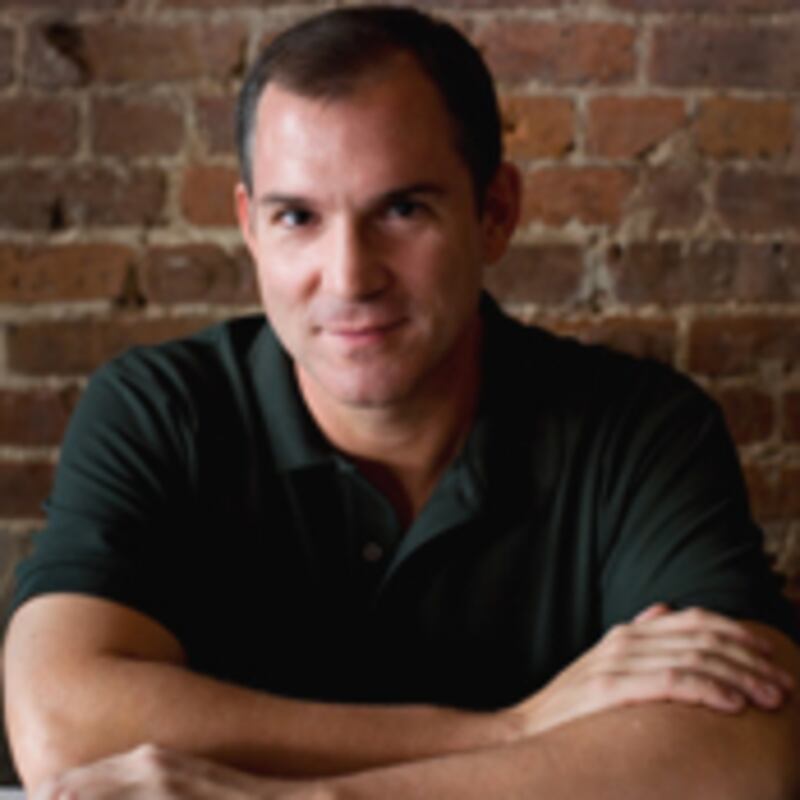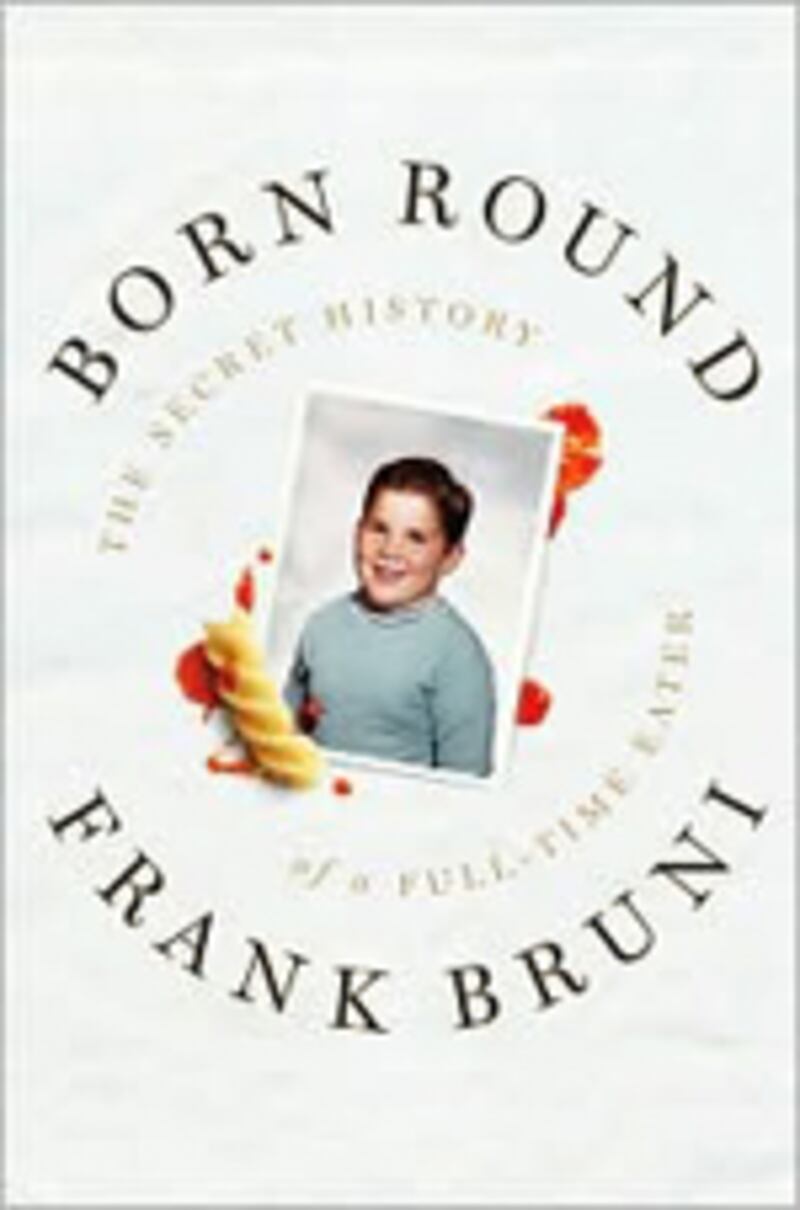
Is there a better job out there than restaurant critic? After all, what could be better than dining at fabulous restaurants in a wig from the Raquel Welch collection (if you’re a woman) or a giant Tom Selleck-like mustache (if you’re a man)? Oh, and of course the beauty of it all is that someone else pays for all those three-course meals.
Frank Bruni was the famous, though incognito, restaurant critic for The New York Times for several years, but when he was offered the plum posting, in April 2004, he hesitated. He was the Times' Rome bureau chief then, and his editor was also concerned. Bruni had battled with his weight all his life and had recently shed 70 pounds. Would he be able to nibble on foie gras, slurp fettuccine Alfredo, and sample chocolate mousse without putting on weight again?
Happily, the answer was yes, and the story is charmingly recounted in his memoir, Born Round. Bruni candidly writes of his weight struggles, which included bulimia, laxative abuse, and junk-food binges. Anyone who has ever dreaded stepping on the scale will relate when he reminisces about his dreaded ascent to size 42 Gap khakis. But though the subject is serious, the book is a completely hilarious, wonderful read.
Bruni is now a staff writer for The New York Times Magazine. We spoke recently about his weight-loss secret, finally taking off his disguise, and the horrifying act of reading his book on tape.
Why did you decide to write this book?

Short answer is I thought I had a good story to tell. I thought that I was at a point in my life where I had spent a lot of time trying to forge a healthier relationship with food, and in trying to figure out how to enjoy food the way I wanted to without being undone by it. I had done a lot of thinking about my relationship with food over time, my relationship with my weight, and as I thought about all of it, I thought, there’s a story here. There’s an interesting adventure that I think will resonate with anybody who’s ever worried about how much they love food—or on even a more minor level, struggled with his or her weight—and so I wanted to tell that story. Also, I’m a big reader of food journalism and food literature, and I’d read many, many wonderful memoirs by journalists focusing on the world of food, and none of them, none of the ones I’d read, kind of explored the other side of eating, which is overeating and the peril of letting one’s love of food tip into excess.
Unfortunately, don’t you think your story is very American?
I don’t think I would have written this book—and I don’t think I would have been able to come to a healthier relationship with eating and food (I hardly think I’ve got it all solved)—if I hadn’t lived in Western Europe precisely when I did. I moved to Italy right after I had worked my way back from being about 70 pounds overweight, and I had the good luck of moving to Italy and working in Italy right at the time when I was trying to figure out, ‘OK, how do I make sure I never relapse?’ And I saw very starkly the difference between the way Western Europe and Americans view food. In Italy I don’t remember ever seeing a Big Gulp-type phenomenon. I don’t remember ever seeing signs that said ‘All You Can Eat Buffet.’ I don’t remember there being a super-size option at the McDonald’s that was right across the street from the Times bureau in Rome. There wasn’t that notion that the best thing that can happen to you is to have a super overabundance of food. To my eyes that was completely absent, and that for me was really instructive, helpful, and illuminating in terms of figuring out how to chart my own course with food.
Did you find it embarrassing to list all the junk food you binged on?
It wasn’t embarrassing to write it, or think about it, because writing is such a solitary act. It was more kind of cathartic and interesting. It was interesting almost in the way I think people in therapy try to make sense of their lives. Sitting and writing about it was helpful because it was a manner of therapy. It was a manner of taking a pause, creating a time to look back through and make sense of one’s own behavior. The only time I realized, ‘Wow I’ve let a lot of intimate stuff hang out for the world to see,’ was when I recorded the audiobook, because you do that, you’re in a booth and there are technicians right outside of it, and I had to read word-for-word the entire book. And only then I realized how extraordinarily personal and intimate some of it was, and how bound some of it was to be consumed by strangers; it was at those moments when I was recording the book. I was doing it looking through a pane of glass at two utter strangers who were hearing me confess and cop to all this stuff in real time.
Do you see your eating issues like an addiction to drugs or alcohol?
I do. I’m not qualified to say whether it is analogous to an addiction, but it feels that way to me. Based on what I have read, and anecdotally, based on what education I do have, I’m a fairly classic compulsive eater, and the compulsive aspect does feel like addictive behavior. But I mean I don’t have a history of therapy, I don’t have diagnoses, so I’m hesitant to use clinical language, but I do take it one day at a time. I don’t feel like, ‘Hey, I’m never going to tip the scales at 70 pounds overweight again. I’m cured.’ I don’t think that way, and I do approach it as more of a week-by-week, day-by-day way.
Did you think it was God’s sick sense of humor when you were offered the job of food critic?
(Laughs) I thought it was ironic. I kind of laughed to myself at the time, but that was the kind of fulcrum and pivot of this book, in that it forced me to figure out if it was a good idea for me to take the job or not. I had to look back on, and make some sense, of my entire eating history, and it was then that I concluded that the source of things that had gotten me into trouble were not the sorts of things that were a part of this job. It was when I concluded that, or in the process of concluding that, and making sense of a long and winding history, that led me to realize I had a story to tell.
So your weight-loss secret is…
My weight-loss secret is: Don’t deprive yourself too much. If you practice a regimen of deprivation that is too extreme, you won’t find any kind of balance, and you’re going to end up experiencing episodes of excess that erase and nullify those periods of deprivation. And they will probably outnumber those periods of deprivation and you’ll end up not in the black but in the red.
When you go to a bodega, what’s the one candy bar calling your name?
I love Kit Kats. I love, love, love the Kit Kat bar. I like Twix a lot. I don’t see a lot of Baby Ruths, and I’m glad of that because I think that’s a pretty nifty bar, too. I would say the Kit Kat bar is my favorite at this point in time.
How many do you have a week?
Oh, I probably don’t even have one a month.
Wow! That’s pretty good.
I’m good because I have so many great desserts coming at me at restaurants that there really isn’t a lot of space or call. The question is how many Kit Kat bars will I have in the next month.
When you were made food critic, did you suddenly acquire a whole lot of new friends?
Yeah, there were a lot of people—but not in a bad way—a lot of people in a very sweet, flattering way who want to go out and eat with a restaurant critic. That’s lovely. It was flattering, but I also knew it wasn’t so much about me. It was about the position. The Times restaurant critic has been the object of some fascination, and the fact that every critic has been the object of fascination tells you it’s about the job. It’s a job that is surrounded by a lot of curiosity, and it’s a privilege to be in that position.
Did you feel like a member of KISS when they first took off their makeup when your jacket photo came out?
No I didn’t feel that way, but it was funny because I made a decision long ago—because I didn’t want to become self-conscious—that I would not spend a lot of time reading the kinds of blogs that chatter about restaurant critics or chatter about the Times restaurant critic, meaning me. But I did notice on some of the Internet stuff that people emailed me or I stumbled across that there was a lot of reaction to my photo. One food person even tweeted that it looked like I'd had some work done, and that made me laugh hysterically. So no, I didn’t feel like a member of KISS, but it was hilarious to have people dissect my appearance. I’m not a movie star. I’m not in the world in which one’s physical vanity is relevant or in which one’s attractiveness or lack thereof is relevant. And yet for a brief moment of time, because my image was new to people, I was being analyzed and chatted about that way.
Is it hard thinking of new ways to describe food? How many different ways can you talk about salmon?
It’s very hard, and my fear and belief is that if you searched “Bruni and succulent” or “Bruni and tender”…yeah, food writing. Be nice to your food writer because it’s tough in the sense that the arsenal of adjectives to describe food is limited, so it’s a real challenge. It’s a challenge, I’m pretty certain, I did not always rise to and I really respect those people whose writings never show the strain of those limited adjectives. Mine surely did on many occasions.
How weird will it be not going to great restaurants every night?
I think it’ll be really enjoyable and a breath of fresh air and weird in equal measures. I think it will be both. I’m really looking forward to it because I like change. I like variation, and even though the restaurants and the menus change all the time, if it’s going out to restaurants night after night after night, there’s an inherent sameness to the ritual, so I’m really looking forward to the departure. But I’m sure there will be nights when I feel a pang that I’m not in a restaurant eating a fantastic meal on someone else’s dime.
What’s your favorite restaurant?
I’ve never been able to answer the question. I don’t have one.
OK, top three.
I don’t even have a top three because when you have as many restaurants in your mental Rolodex as I do, it’s all about mood and budget and appetite on a given moment. No restaurant satisfies every sort of hunger you could have or every sort of mood you could be in. I probably have 50 favorite restaurants, all depending on what my peculiar given want is at a moment.
Are you a good cook?
I’m a terrible cook. I’m one of the world’s worst cooks. I’m going to make a concerted effort to be better because I love the rituals that surround food. I love making food the centerpiece of an evening. Most parts of me would love to be able to have people over and serve them a wonderful meal. Up until this moment in my life I have been unsuccessful at that. I get to chatting with people and the meatloaf burns, or I get impatient for something to be ready and I convince myself that the roast chicken really is done because I want me and everyone else to eat, and it still has liquids that are not running clear. Maybe at the age of 44, I’ve developed a discipline and maturity and patience that will enable me to cook with more success than I have in the past, but that remains to be seen.
Favorite food movie?
I just saw Julie & Julia, and in terms of a movie’s ability to make one hungry, that movie made me ravenous. I think Nora Ephron does such a terrific job in that movie filming food, whether it’s a pat of butter sizzling or other stuff. I think it does an especially good job at celebrating the allure of food and cooking.
Are you nervous about your upcoming book tour?
Part of me hears myself talk and I think I sound like a complete idiot. I’m used to doing the interviews. It’s a very unsettling and scary experience to be fielding questions rather than answering them, and it kind of feels like the world’s been turned on its head a little bit. It feels wrong and I’m sure I handle it horribly. This is going to sound really corny, but I feel I’m proud of the book, and it’s weird to say this of a book that has a lot of dysfunction in it, but I also feel like the book is a good time. I want people to read it and so talking about all this stuff and myself—if it directs people to something that is rewarding to them—then I very much want to do it, but it will never stop feeling strange.
Plus: Check out Book Beast, for more news on hot titles and authors and excerpts from the latest books.
Nicki Gostin interviews celebrities for newsweek.com. She has written for Newsweek, TV Guide, The Age newspaper, and Australian Women's Weekly, and has appeared on Entertainment Tonight. She dates her interest in celebrities and the Royal Family back to when she was 5 and wrote letters to Sesame Street , the Queen, and Basil Brush (a British puppet fox with his own TV show).






